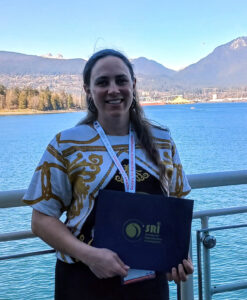Biomedical Sciences PhD student Tori Kennedy received the President’s Presenters Award from the Society for Reproductive Investigation at its 71st annual scientific meeting held in Vancouver, BC, Canada last week.

The conference theme was supporting healthy lifecourse trajectories and Kennedy’s award-winning research project titled “Impact of Placental SLC2A3 RNA Interference Throughout Gestation,” examines what happens when maternal delivery of glucose to the placenta is impaired in sheep.
“It was really rewarding to be part of this conference and get to interact with so many different physician scientists, neonatologists, and researchers and to explore the greater context of how our science can be applied to healthcare,” said Kennedy.
Kennedy, a first-generation college student, earned a bachelor’s degree from Ohio State and a master’s degree from North Dakota State, both in animal sciences, before coming to CSU to study biomedical sciences.
In the lab of her adviser Russ Anthony, the Hill Professor of Animal Biotechnology in the Department of Biomedical Sciences, Kennedy’s research focuses on glucose transporters in the placenta, and how dysfunction in that process affects placental insufficiency and can lead to fetal growth restriction. This work helps contribute to a better understanding of various high-risk pregnancies and conditions associated with low circulating glucose and small for gestational age, including diabetes and cardiovascular disease.
“Tori’s results are exciting and demonstrate the ability of the placenta and fetus to compensate in the face of impaired uterine glucose uptake throughout gestation, allowing placental and fetal growth to recover during the second half of gestation,” said Anthony. “While the fetal pancreas was able to recover its growth, it’s hyper-responsiveness to amino acids near-term demonstrates long-term impacts on pancreas function.”
After finishing up her PhD work, Kennedy will begin a postdoctoral research position this summer at the Cincinnati Zoo that focuses on conservation biology and their Polar Bear Signature Project, which includes helping to develop improved methods for artificial reproductive technologies. Her ultimate career goal is to work as a reproductive physiologist for wildlife conservation.
“The Biomedical Sciences program at CSU well prepared me for the research I’ll be doing at my postdoc,” said Kennedy. “From working with animals and conducting metabolic studies to collaborating with neonatologists at The University of Colorado Anschutz Medical Campus, my time here has been really valuable and it’s been so cool to be part of work that is contributing to the field of neonatology. I am looking forward to bringing all of the skills and technologies I learned here to my passion for wildlife conservation and I hope I can continue to engage in collaborations that bridge different scientific fields.”